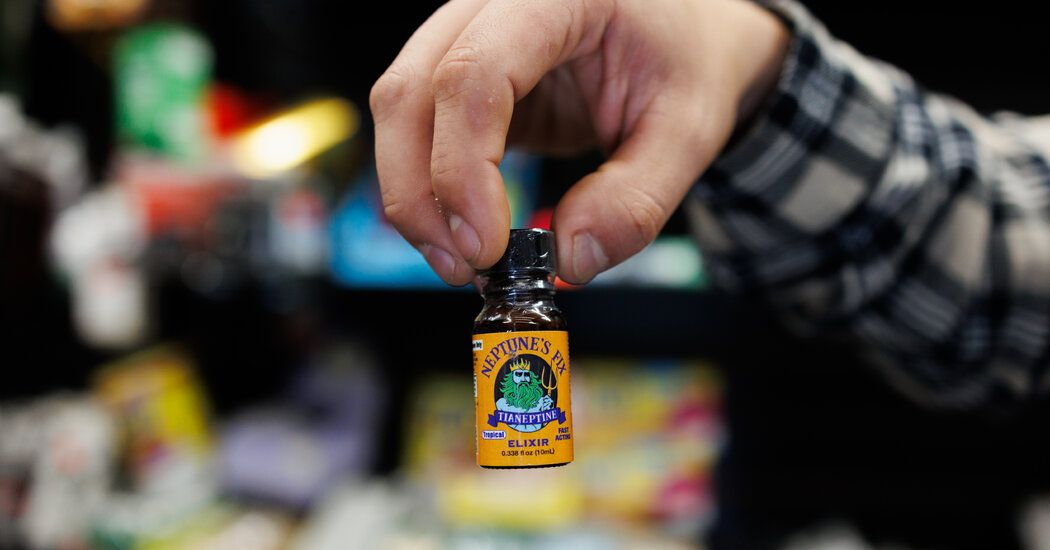The young father crossed the parking lot to join the other parents who met their children's new preschool teachers. After a few steps, he began to sweat and shake. As the sky wavered, he staggered back to the car, desperate to lie down in the back seat and breathe, hidden by the tinted windows.
“Did you drink something?” his wife, Anne, yelled at him as he dialed 911. Eric, 26, had completed his rehab earlier in the summer.
“The shot! The shot!” she moaned, just before falling to the ground and passing out.
In the emergency room of a nearby hospital in southern New Jersey, doctors tried to revive him with a defibrillator.
“What is he up to?” They yelled at Anne.
He showed them a shot-sized bottle of cherry-flavored elixir that he had taken from the car. He was labeled Neptune's Fix, which Eric had purchased at a local store.
“What the hell is that?” asked a doctor.
Neptune's Fix contains an ingredient called tianeptine, popularly known as gas station heroin.
Tianeptine, often sold as a dietary supplement and promoted by retailers as a mood booster and concentration aid, is among a growing, unregulated class of potentially addictive products available at gas stations, convenience stores, convenience and tobacco stores, as well as on the Internet. They typically include synthetic pharmaceuticals and substances of plant origin.
Some, such as kratom and phenibut, can be addictive and, in rare cases, fatal. They often originate from other countries, including Indonesia and Russia, where they are commonly used, and even prescribed, for mood management. But the Food and Drug Administration has not approved them as medicines in the United States.
“Tianeptine is an emerging threat,” said Kaitlyn Brown, chief clinical officer of America's Poison Centers, which represents and collects data from 55 centers nationwide. “We have people who can get a substance that is not well regulated, that has potential for abuse, and that, in high doses, can cause opioid-like effects, leading to really harmful outcomes.”
At least nine states have banned or severely restricted tianeptine, including Florida, Michigan and Ohio. In late November, the FDA issued a nationwide alert about Neptune's Fix specifically and tianeptine in general, warning people not to take it and warning that it had been associated with overdoses and deaths.
Tianeptine, which also appears as a concentrated powder or as an ingredient in products such as Tianaa, Zaza and Pegasus, “is sold illegally with claims to improve brain function and treat anxiety, depression, pain, substance use disorder opioids and other conditions,” the agency said. warning he said.
The FDA loosely oversees dietary supplements, an expanding universe of some 50,000 products that includes minerals, vitamins and compounds such as melatonin. But the agency does not evaluate the safety or effectiveness of supplements; it can only prohibit manufacturers from marketing them as medical treatments. Requires labels on products that make health claims to list ingredients and include boilerplate disclaimers, such as noting that the product has not been reviewed by the FDA. The agency does not check those labels before launching a product.
Because the FDA's enforcement powers are limited by law, many tianeptine products have long escaped labeling requirements. Although the FDA has explicitly said, for example, that tianeptine does not qualify as a dietary supplement, the labels of some brands, such as Tianaa, still make that claim.
“There are now at least a dozen different products that are foreign drugs that are openly marketed as dietary supplements in the eyes of the FDA, with the FDA unable to stop sales,” said Dr. Pieter Cohen, an associate professor at the School of Medicine. Harvard Medicine, who studies the regulation of supplements.
Tianeptine is a drug developed by French researchers in the 1960s as an antidepressant. It is approved in low doses for this use in many European, Asian and Latin American countries.
But at higher doses, it also works much like an opioid, generating a short-lived euphoria. In the United States, many people take tianeptine under the widespread and mistaken belief that it is a safe alternative to street opioids like fentanyl or heroin, or even a way to reduce their use. On social media sites like Reddit, its merits are hotly debated, with more than 5,000 people subscribed to a forum on “Quitting Tianeptine.”
“People develop tolerance very quickly, so they quickly start increasing the dose,” said Dawn Sollee, a clinical toxicologist and director of the Poison Control Center in Jacksonville, Florida. “They'll set alarms to wake up every two hours to take tianeptine pills so they don't go into withdrawal. And then they have to keep taking more and more to stay functional.”
Expenses can add up quickly, along with dangers. At a convenience store in Montclair, New Jersey, recently, 15 capsules of Tianaa Red cost $34. A bottle of Neptune's Fix, which comes in lemon, tropical, cherry, or chocolate-vanilla flavors, costs about $16. A salesperson at a roadside tobacco store further west said customers typically bought cases of 12 bottles. A salesperson at another roadside store said one customer bought 10 boxes each week; he didn't know if for resale or personal use.
Determining the number of cases of tianeptine abuse is challenging because hospitals do not test for it. Reports to poison control centers are voluntary and usually made by a concerned family member, so officials say the numbers represent a drastic undercount.
But case reports are increasing. In 2013, only four cases of tianeptine exposure were reported nationwide. In 2023, 391 cases were reported, according to the United States Poison Centers. New Jersey, which typically has one report a year, received 27 in 2023, with patients ranging in age from 20 to 69.
“Some people apparently think it can help with chronic pain rather than having to use an opioid, which could explain the older demographic,” said Dr. Diane Calello, medical director of the New York Poison Control Center. Sweater.
Like many illicit drugs, tianeptine is often carelessly mixed with unlabeled ingredients, such as potent synthetic cannabinoids. That's one reason why overdose symptoms appear to vary widely, poison control medical directors said, and include dampness, nausea, low blood pressure and unconsciousness, as well as seizures and severe stomach cramps.
Sometimes naloxone, a drug that reverses opioid overdoses, can be effective in reviving patients, they said, and sometimes not. At least four deaths have been associated with tianeptine.
About a year ago, Dr. Raymond Pomm, an addiction psychiatrist at Gateway Community Services in Jacksonville, saw his first patient on tianeptine. To treat the patient's withdrawal symptoms, he tried buprenorphine, a medication that calms opioid cravings. He said he found that it helped patients manage tianeptine withdrawal and maintain abstinence.
Last summer, after Eric completed rehab from kratom, a potentially addictive herb from Southeast Asia that is widely available in convenience stores and tobacconists, doctors recommended medication for anxiety and depression. But Eric, a corporate marketer from a South Jersey suburb, was determined to stay away from the mood-altering prescriptions to which he had been addicted in the past.
In a tobacco store, he saw Neptune's Fix. One salesman said he could help with his mood and wouldn't get him hooked.
“Since it was sold in stores, I thought it couldn't be that bad,” said Eric, who, like Anne, asked to be identified by his middle name to protect his family's privacy. “You know, kind of an energy drink.”
After returning a drink, he felt better almost immediately: more talkative, happy, and confident.
But soon Eric said, “I couldn't stop taking it.”
Within a few weeks, he was downing up to five bottles a day and spending more than $400 a week. Her energy was flagging. Although he was a former college athlete and was still used to working out daily, he now couldn't even go to the gym.
When he tried to quit cold turkey, the withdrawal caused cold sweats, muscle aches, restlessness, and irritability.
Weeks after he collapsed in the preschool parking lot, doctors at the New Jersey Poison Control Center tested the contents of his bottles of Neptune's Fix. The results included synthetic cannabinoids and other unlisted ingredients, as well as tianeptine.
The FDA sent warnings in 2021 and 2022 to two companies that it said were “illegally marketing tianeptine products as dietary supplements and unapproved drugs.”
But enforcing these laws requires enormous resources, in part because manufacturers and suppliers can be difficult to locate. A New York Times inquiry to the creators of Neptune's Fix sent through their website received no response. The Sheridan, Wyo., location listed on the company's bottles is the address of an agent of record for numerous companies.
Regulatory experts disagree on how the FDA should effectively address tianeptine and other supplements. Some say the agency should establish a strict registry of approved supplements.
In interviews, some poison center directors did not support an outright ban on tianeptine, saying it could lead to dangerous illegal trafficking. Educating emergency services and consumers about the risks inherent in such products would be a more effective course, they said.
Taking tianeptine off store shelves, they added, would not only be a staggering task but also of limited usefulness because customers could simply buy it from the most convenient store of all: the Internet.
While Eric was recovering from tianeptine poisoning, Anne broke into the local tobacco shop where he had purchased it.
“My husband is in the hospital for this product and they are still going to keep it on the shelves?” she screamed.
“Yes,” he said, the owner responded, “because people want it and we need to make money.”












